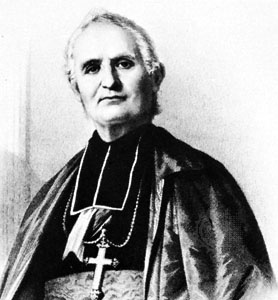Dupanloup, Félix-Antoine-Philibert
bishop of Orléans
born Jan. 3, 1802, Saint-Félix, Fr.
died Oct. 11, 1878, Lacombe
 Roman Catholic bishop of Orléans who was a clerical spokesman for the liberal wing of French Catholicism during the mid-19th century.
Roman Catholic bishop of Orléans who was a clerical spokesman for the liberal wing of French Catholicism during the mid-19th century.Ordained priest in 1825, Dupanloup began his series of successful catechetical classes at the Parisian Church of the Madeleine. As director of the Parisian junior seminary of Saint-Nicolas-du-Chardonnet (1837–45), he attracted many lay students. He was prominent in the struggle for educational freedom under the July Monarchy and was an architect of the Falloux Law (1850), which gave legal status to independent secondary schools. While bishop of Orléans (consecrated 1849), and as a member of the French Academy (elected 1854), he helped reorganize the liberal Catholic journal Le Correspondant.
When papal temporal sovereignty was threatened by Emperor Napoleon III, Dupanloup defended it in a series of public letters (1860), but he supported Louis-Adolphe Thiers's refusal to reopen the issue after 1870. His explanation of Pope Pius IX's Syllabus of Errors under the terms thesis and hypothesis became famous. At the first Vatican Council (Vatican Council, First) (1869–70) he was one of the party that considered the definition of papal infallibility to be inopportune. His Christian Marriage and The Studious Women have been translated into English.
- Grigore Gafencu
- Grigori Perelman
- Grigorovich, Yuri Nikolayevich
- Grigoryev, Apollon Aleksandrovich
- Grigory Grigoryevich, Graf Orlov
- Grigory Grigoryevich Orlov, Graf
- Grigory Ivanovich Tunkin
- Grigory Konstantinovich Ordzhonikidze
- Grigory Yefimovich Rasputin
- Grigory Yevseyevich Zinovyev
- Grigson, Geoffrey
- Grijalba, Juan de
- Grijalva River
- Grillparzer, Franz
- Grimaldi Family
- Grimaldi, Joseph
- Grimald, Nicholas
- Grimké, Angelina Weld
- Grimké sisters
- Grimm, Brothers
- Grimmelshausen, Hans Jacob Christoph von
- Grimm, Friedrich Melchior, Freiherr von
- Grimm, Hans
- Grimm's law
- Grimoald